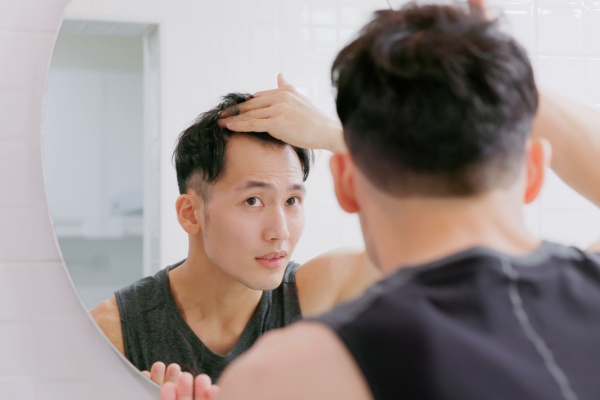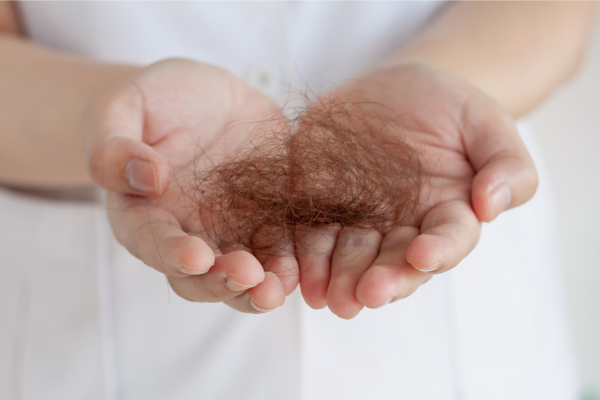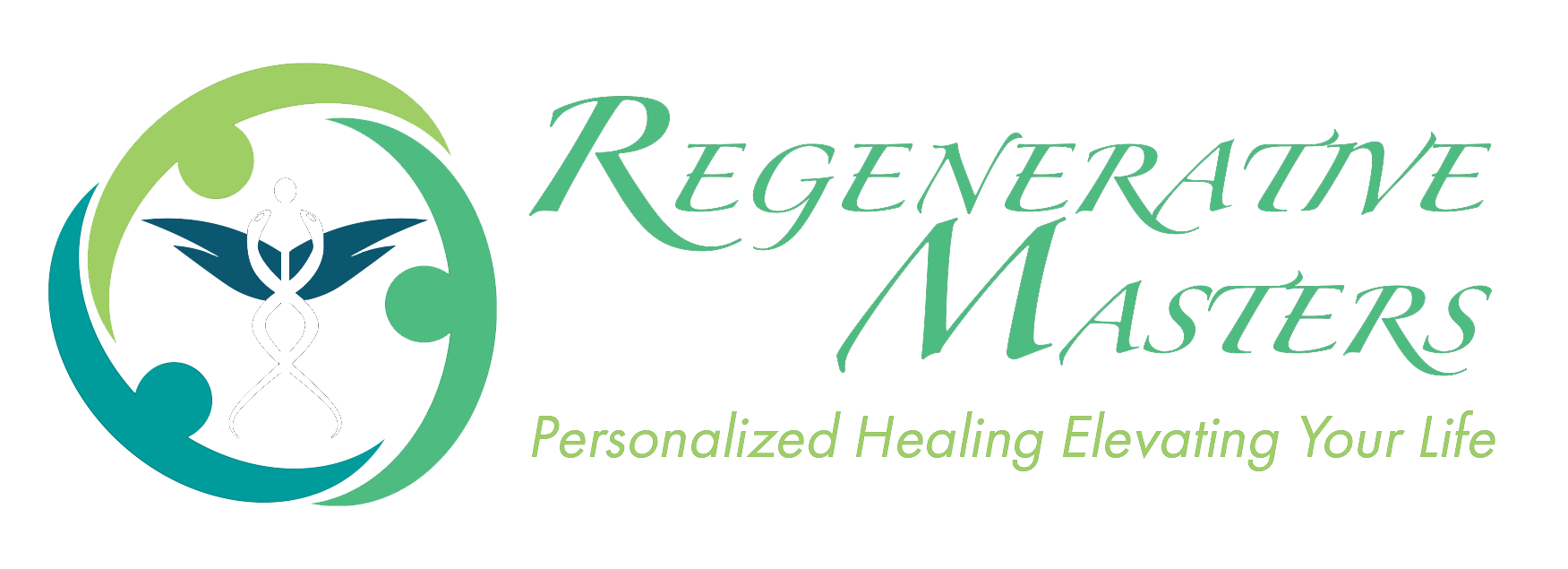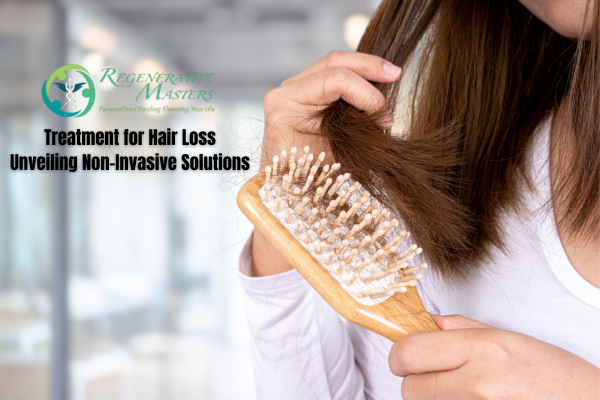Hair loss poses a significant concern for both men and women across various stages of life. Statistics reveal that approximately two-thirds of men will experience hair loss and eventually seek viable alternatives for male pattern baldness, which stands as the predominant form of hair loss in men.
Addressing the issue of hair loss involves exploring a spectrum of treatment options, ranging from surgical interventions to non-invasive alternatives. There are several non-invasive hair loss treatments available for people who are scared to undergo surgical procedures.
Understanding Hair Loss
Hair loss, often linked to androgenic alopecia, is a common concern. This hereditary condition can also result from cancer treatment, autoimmune diseases, or hormonal changes. Men typically experience bald patches and receding hairlines, while women commonly notice thinning hair and widening parts, including a potentially receding hairline. Understanding these distinctions is crucial for informed decisions on addressing hair loss.
Treatment for Hair Loss — What Are the Various Methods?

At Regenerative Masters, our experience with numerous clients facing hair loss has allowed us to witness remarkable transformations. While surgical treatments have been chosen by some, we understand that invasive paths may not suit everyone.
Whether you harbor concerns about the safety of surgical procedures, wish to stay local for your treatment, or simply prefer a non-invasive cure for hair loss, we respect your choice for a non-surgical approach to address hair loss. Here, we explore some of the most sought-after non-surgical cures for hair loss.
Cure for Hair Loss

Platelet-Rich Plasma (PRP) Therapy
Considered among the top non-surgical treatments for hair restoration, Platelet-Rich Plasma (PRP) therapy involves injecting platelets extracted from the patient’s blood into the scalp. This relatively recent method utilizes various proteins and growth factors to stimulate the body’s healing processes and encourage hair growth.
Low-Level Laser Therapy (LLLT)
Low-Level Laser Therapy (LLLT) is a non-surgical approach to address hair loss by stimulating cell growth. This treatment employs low-intensity light to encourage the development of epidermal stem cells in the hair follicle bulge. It has received approval as a safe and effective solution for promoting hair growth in both men and women.
Hair Growth Tablets
Effective non-surgical options for hair restoration include clinically proven and FDA-approved hair-stimulating tablets and serums. Medications such as DHT-blockers in pill form, Propecia (Finasteride), and dutasteride (Avodart) are available. Vitamin and mineral supplements can also be considered to address hair loss caused by illness or medications. However, it is imperative to confer with a healthcare professional before starting any hair growth tablet regimen.
Topical Solutions
Topical hair loss products, available in liquid or foam forms, are applied directly to the scalp. These products encompass a range of options, including hair growth shampoos, serums, and medications such as topical anthralin for alopecia areata, topical tretinoin (Retin-A) combined with minoxidil for female and male pattern baldness, and over-the-counter topical minoxidil for various hair loss conditions.
It is suggested that you obtain the advice of a healthcare expert before using any of these drugs. Additionally, results from these treatments typically become apparent only after several months of consistent use.
Pep Factor
Pep Factor represents an advanced treatment option for scalp rejuvenation, effectively addressing up to stage 5 hair loss. The insertion of the right amount of collagen into the scalp stimulates hair follicles, resulting in improved hair development. This treatment yields fast results, with noticeable changes in as little as a few weeks.
Scalp Micropigmentation
Scalp Micropigmentation is a hair replacement technique that utilizes specially formulated ink to create the illusion of natural hair. This treatment involves the application of ink to the scalp, forming various shades and dots to mimic closely shaved hair.
Healthy Diet
For the purpose of promoting hair development and preventing or reducing hair loss, a balanced diet is crucial. Nutrient imbalances can contribute to hair loss, making it essential to avoid skipping meals, stay hydrated, consume adequate protein, and include iron-rich foods, vitamins, and minerals in the diet. Nutrient-dense foods like eggs, fish, and dairy products play a significant role in supporting overall hair health. A healthcare professional’s advice might assist in customizing food choices to meet specific demands.
Embracing a Holistic Approach

Beyond specific treatments, adopting a holistic approach to hair health can enhance the effectiveness of non-invasive solutions.
1. Nutrition and Diet
Healthy hair development requires a diet high in vitamins and minerals and well-balanced. Incorporating foods high in biotin, iron, and vitamins A and E can contribute to stronger and more resilient hair.
2. Stress Management
Since long-term stress has been connected to hair loss, stress reduction is an essential component of any plan for hair restoration. Deep breathing techniques, yoga, and meditation are among the activities that may help to reduce stress and increase overall well-being.
3. Scalp Care
Maintaining a clean and healthy scalp is fundamental to preventing further hair loss. Regular washing, careful massage, and the use of scalp-friendly products can all help hair follicles develop.
Conclusion
In the quest for effective treatment for hair loss, non-invasive solutions offer hope to those seeking to restore their mane without resorting to surgery. Whether through PRP therapy, low-level laser therapy, or emerging techniques like microneedling and stem cell therapy, the options are diverse and continually expanding.
It is crucial to consult with a licensed healthcare professional or a specialist in hair restoration to identify the most suitable course of action for your specific requirements. By combining non-invasive treatments with a holistic approach to hair health, individuals can take proactive steps towards a fuller, healthier head of hair and, ultimately, renewed confidence.
Contact the professionals of Regenerative Masters today and regain your confidence.
FAQs
How close are we to curing baldness in 2023?
The prospect of finding a definitive cure for baldness in the near future appears improbable. Ongoing scientific research plays a crucial role in deepening our understanding of the condition; however, as of now, there haven’t been any significant breakthroughs that point toward a permanent solution.
Has anyone reversed baldness naturally?
If your hair follicles are still in good health, there is a possibility to reverse balding and initiate the regrowth of hair. However, it’s important to manage your expectations, as regrowing hair naturally typically takes time and may not yield significant results in a short period.
How can you increase hair density?
Enhancing scalp blood flow through regular massages with nourishing hair oil is a proven method to boost hair density. This impact can be heightened by incorporating a diet abundant in Protein, Vitamin D, Folic Acid, Zinc, and Iron, all of which contribute to the improvement of hair density.

